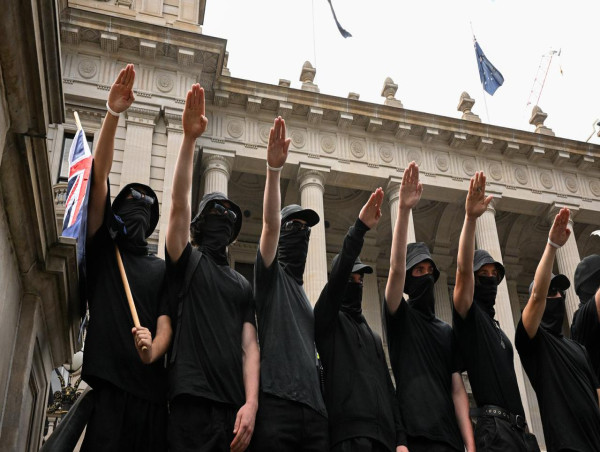People showing Nazi symbols will face jail time or fines under proposed laws in Queensland and Tasmania amid intense concern about a recent Neo-Nazi protest in Melbourne.
Victoria and NSW have already criminalised the display of Nazi symbols while Western Australia intends to do the same.
Queensland Attorney-General Shannon Fentiman will introduce a bill on Wednesday to ban the display, distribution or publication of extremist hate symbols such as the swastika, including on social media.
The proposed laws will increase the penalties for crimes motivated by racial, religious, sexual or gender identity hatred.
They will give police the ability to seek access to stored communications, including phone records when investigating cases of serious vilification.
"Like all Australians, I was shocked and disturbed by the footage of Neo-Nazis standing on the steps of the Victorian Parliament in the last fortnight," Ms Fentiman told parliament.
"The brazen display of these hateful and disgusting views must be condemned publicly and unequivocally.
"Hate crimes and vilification have absolutely no place in Queensland or this country and must not be tolerated."
Offenders will face prison terms of up to three years under the proposed laws.
Tasmanian Attorney-General Elise Archer has tabled a bill to ban the swastika, and the Nazi salute as well, which she called "a blatant breach of both our moral and community standards",
"Following the recent disturbing use of the Nazi salute during a demonstration in Victoria, the Bill will also prohibit the use of the Nazi salute," Ms Archer said in a statement on Wednesday
"Our government wants everyone in our community to feel safe from these disturbing displays, whether it be the display of Nazi symbols or the use of the Nazi salute, as we know they can cause hate and fear."
People convicted of displaying Nazi symbols or making salutes in Tasmania will face fines of up to $3620 or three months imprisonment.
Fines or prison terms will be doubled for repeat offenders.
Both, the Queensland and Tasmania bills include exceptions for Hindus, Buddhists and Jains, for whom swastikas are religious symbols.
There will also be "sensible exemptions" if Nazi symbols are displayed for other religious, cultural, academic, and educational purposes and in opposition to fascism, Nazism or neo-Nazism in both states.
Queensland Premier Annastacia Palaszczuk said it was time to take stronger moves against vilification, particularly with the state's new holocaust museum set to open this year.
"I've spoken about the experiences of my own family who fled post-Second World War Europe to seek a better life here," she told parliament.
"We must never forget history and its ongoing legacy on our community."
Ms Palaszczuk foreshadowed the planned ban last May after a Nazi flag was displayed near the Brisbane Synagogue and a train carriage was vandalised with Nazi symbols.
Queensland Jewish Board of Deputies vice-president Jason Steinberg said at the time there had been a notable rise in anti-semitism.
Some 60 per cent of the Jewish community had reported being vilified, while many feared police would not take the incidents seriously.






